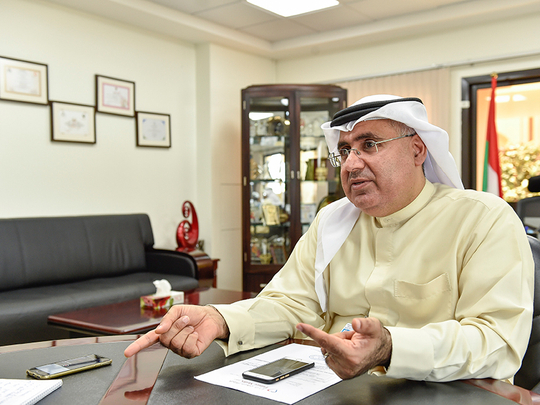
Sharjah: An Emirati youth who fought back after being clinically dead for 30 minutes last week to become the country’s first recipient of an artificial heart is recovering well, Gulf News can exclusively reveal.
Salem Juma Mohammad Al Junaibi, 21, sat on his bed and ate breakfast on Monday morning, a doctor at Al Qasimi Hospital said. “He has an infection but is recovering well. His heart, liver and kidneys had failed, but now all organs are functioning normally,” said Dr Aref Al Nooriani, the cardiologist who led a 30-member surgical team on June 22.
“His lung is also picking up but it is taking longer than expected because of his condition before the surgery… his heart was damaged just after birth when he acquired a viral infection, damaging his heart muscles.”
Dubbed a “fighter” by Dr Al Nooriani, the patient was referred to Al Qasimi Hospital on June 11 in poor condition. “Two days later, he had a cardiac arrest and we thought we had lost him,” the doctor said, adding, “he was clinically dead”.
“He is muscular and tall and we are amazed by the fact that he came out of this ordeal… we thought he had passed away and after 30 minutes we decided to put him on an external pump to restore cardiac function. Someone said he is dead for half-an-hour and why put him on the pump. But we thought he is young and must get another chance and we decided to go ahead. We connected his femoral artery with the external pump that takes over the cardiac function,” the doctor said, recalling the events preceding the implant surgery.
Then a neurologist was called who noticed some brain activity. At this point, the team decided to go for an artificial heart implant. “The challenge was that there are only three companies who can provide this device and usually they don’t accept patients who are in such a bad condition,” he said.
The hospital then contacted Heartware, a medical device company based in Germany. “It was a complex situation, we had to contact the company which had to arrange experts to be flown to Sharjah and the device itself had to be bought,” he said.
“Earlier, we had two such patients — 16 and 18 years old — who died while waiting for a transplant. But this time we though we should not wait,” he said. Three years ago, there was no such device available and physicians were frustrated as they had no other avenues for treatment. “We had many cases of heart failure and were looking for other lines of treatments to save lives.”
On June 22, part of Al Junaibi’s heart was removed and replaced with a left ventricle assist device or LVAD. “We took out a piece of heart muscle — double the size of a dirham coin — and implanted the device, taking over the function of the left ventricle,” the cardiologist said, adding that this device also aided the right ventricle and normal pumping was restored. The device lasts for up to eight years but can survive longer before the patient can go for organ transplant.
“I saw him eating his breakfast of milk, juice and fruits yesterday and today and he is a miracle. He is getting intense physiotherapy,” he said.
Al Junaibi is expected to spend some more time in the hospital. “We are not in a rush to discharge him,” he said while showing the picture of a smiling Al Junaibi sitting on the hospital bed.
Al Junaibi’s family, meanwhile, said they are satisfied with his recovery. “My brother is very happy and he is feeling much better…he told us that he could now breathe easily and felt his heartbeat is regular,” his eldest brother, Omar Juma Mohammad Al Junaibi, said in an interview.
“He wants to be discharged from the hospital as early as possible and resume his normal life. We thank Allah that my brother is recovering now,” he said thanking the team of doctors.
Commenting on the significance of this landmark surgery, the cardiologist said: “It will help in reducing mortality and we get more time for organ transplants… as a centre we are using best technology in management of cardiac ailments and our next step would be a full organ transplant… this has been a learning curve for all of us.”
WhatsApp group
In a first of its kind mode of communication, Al Qasimi Hospital used WhatsApp to bring together a multi-disciplinary team. “We formed a group of 30 specialists who get regular updates on the patient and provide advice,” Dr Aref Al Nooriani said.
It was hard to keep cardiologists, nephrologists, neurologists, anesthetists and other experts on call in order to constantly monitor Al Junaibi. “So we created a WhatsApp group called Sharjah LVAD to stay in touch and we are planning to implement this in the hospital.”












